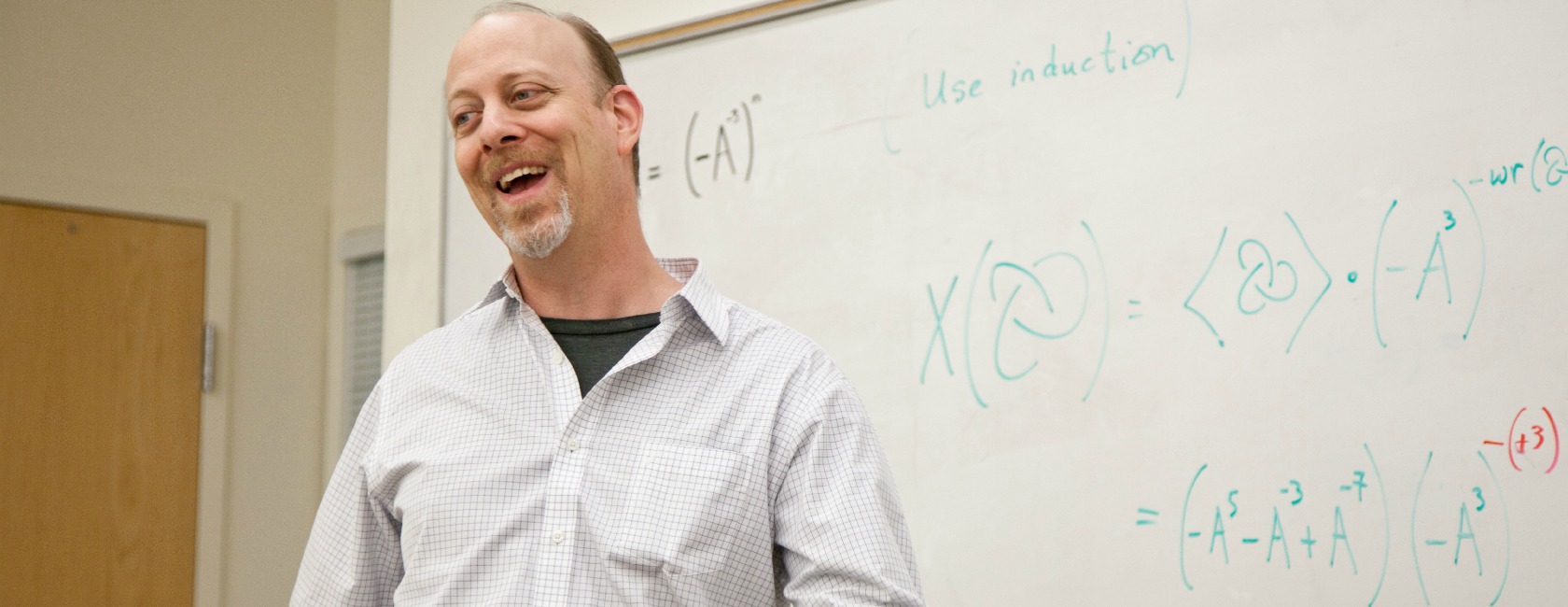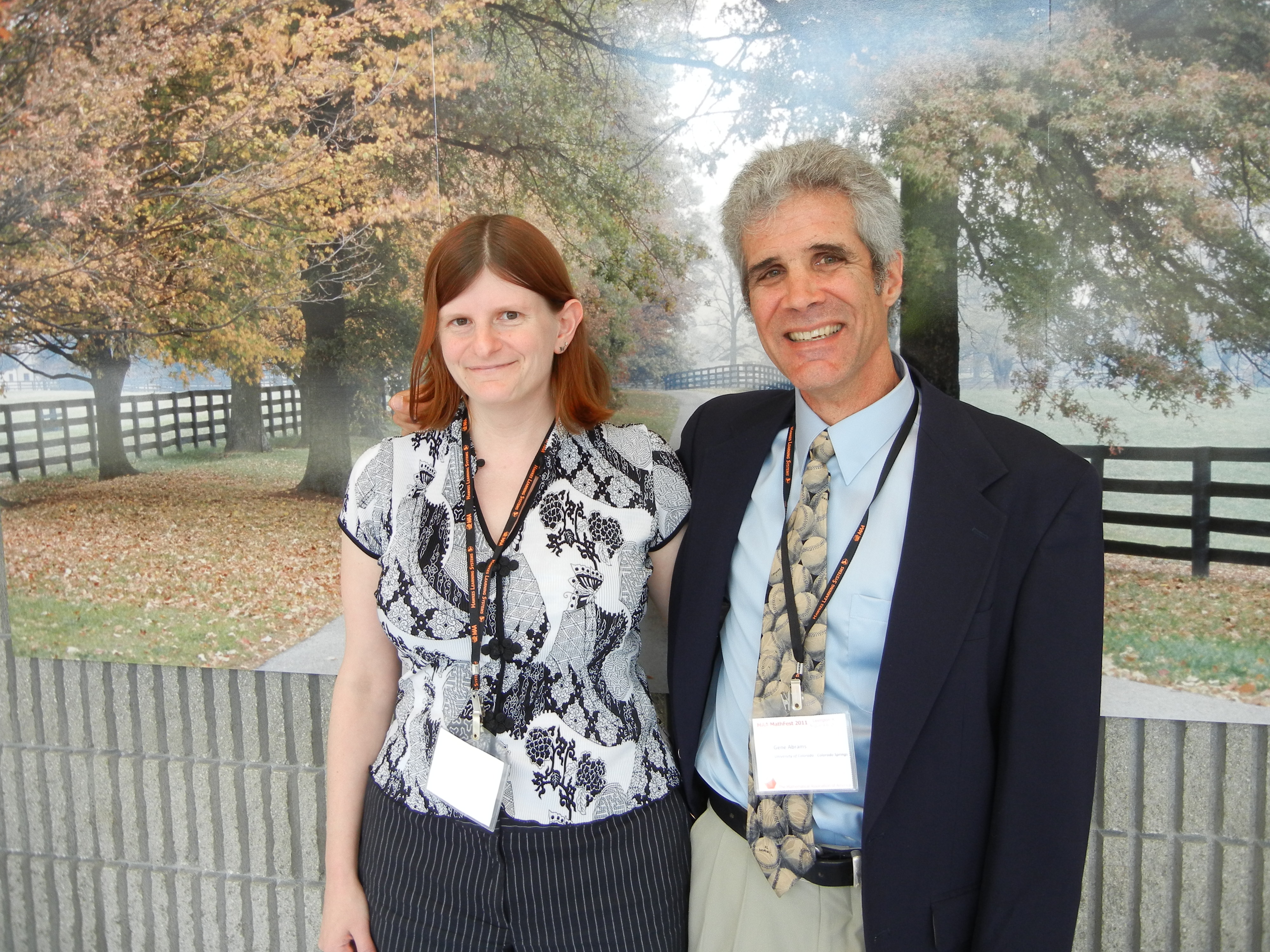PLU Associate Professor Daniel Heath Earns National Mathematics Honor

Image: PLU Associate Professor Daniel “Deej” Heath will receive a national award from the Mathematical Association of America in August. (Photo: John Froschauer/PLU)
Math Department has 4 MAA Honorees on Staff
By Sandy Deneau Dunham
PLU Marketing & Communications
TACOMA, Wash. (April 20, 2015)—Pacific Lutheran University Associate Professor of Mathematics Daniel (Deej) Heath will be recognized with the 2015 Carl B. Allendoerfer Award, a national award sponsored by the Mathematical Association of America, in August.
The Mathematical Association of America (MAA) is one of two major U.S. mathematics organizations and one of the largest in the world. MAA emphasizes teaching, professional development and expository writing, and its Carl B. Allendoerfer Award, established in 1976, is given to authors of expository articles published in Mathematics Magazine. Up to two of these awards are given annually.
“Mathematics Magazine is probably the most-read journal of mathematics in the world; it is very difficult to get an article published in there at all,” Heath said. “I was quite pleased just to have them accept the article and suspected at first that the award notification was an April Fool’s Day joke that arrived a couple days late; I had to read it several times before I believed it.”
Heath is the second PLU recipient of this prestigious award; Associate Professor of Mathematics Jessica Sklar’s in 2011 was the first. In addition, 2005 Mathematics Professor Chris Meyer received MAA’s Distinguished College or University Teaching of Mathematics award, and Professor Jeff Stuart earned its Distinguished Teaching Award in 2001 while at a different institution.
“As a small department, we have received more than our share of MAA recognition—can I say I think it is because we have a lot of talent?” Heath said. “Since it is so difficult to get an article published in Mathematics Magazine at all, it is telling that we have at least three members of the department who have published there. That two members have won this award, especially in such a small department, is truly extraordinary.”

PLU Associate Professor of Mathematics Jessica Sklar, left, and co-author Gene Abrams (University of Colorado-Colorado Springs), after receiving their award at the MAA MathFest at the University of Kentucky in 2011. (Photo courtesy Jessica Sklar)
Sklar and collaborator Gene Abrams received the Allendoerfer prize for their article “Mad Veterinarians.” Sklar said when she originally got her Ph.D., her area of research was very abstract and not accessible by most undergraduates, let alone lay audiences.
“But my passion has always been for popularizing and inspiring enthusiasm for mathematics, so during my time at PLU my scholarship has become increasingly devoted to these goals,” she said. “Mathematics Magazine is the perfect journal for presenting mathematics in an engaging manner, and so has been my go-to journal for submissions in recent years. “
Sklar and PLU Assistant Professor of Mathematics Tom Edgar currently have another article in preparation for submission to Mathematics Magazine: This time the topic is “Confused Electricians.”
Heath has been invited to collect his $1,000 prize and certificate at the MathFest 2015 Prize Session on Aug. 6 in Washington, D.C., where he’ll be honored for his paper “Straightedge and Compass Constructions in Spherical Geometry,” which appeared in Mathematics Magazine, Vol. 87, No. 5, December 2014, pp. 321-409.
“I often teach PLU’s Geometry course (Math 321), which usually has a majority of its students planning to be high-school math teachers,” Heath said. “Because of this, I am always looking for ways to package difficult geometric ideas so my students are motivated to dig into the ideas themselves: I hope they will use similar strategies when they eventually teach mathematics. “
During his last sabbatical, Heath wrote Geometry Playground, a computer program for playing with ideas in geometries “other than plain vanilla.” When testing his program, Heath said, he noticed something strange about constructions in spherical geometry, and he tried to write about that to motivate others, especially his students, to explore the ideas, too. That led him to the ideas in the paper that won the award.
“I have never considered myself an ‘excellent expositor,’” Heath said. “I just wrote the paper to try to encourage others to explore the ideas that I found so fascinating. Evidently I was successful, and that really makes it all worthwhile. Do my students in Geometry appreciate it? It is hard to know. I may be a successful expositor, but I am still learning how to be a good teacher.”


